
The Napoleonic Wars (1803–1815) were a series of conflicts fought between the First French Empire under Napoleon Bonaparte (1804–1815) and a fluctuating array of European coalitions. The wars originated in political forces arising from the French Revolution (1789–1799) and from the French Revolutionary Wars (1792–1802) and produced a period of French domination over Continental Europe. The wars are categorised as seven conflicts, five named after the coalitions that fought Napoleon, plus two named for their respective theatres: the War of the Third Coalition, War of the Fourth Coalition, War of the Fifth Coalition, War of the Sixth Coalition, War of the Seventh Coalition, the Peninsular War, and the French invasion of Russia.

Charles-Maurice de Talleyrand-Périgord, 1st Prince of Benevento, then Prince of Talleyrand, was a French secularized clergyman, statesman, and leading diplomat. After studying theology, he became Agent-General of the Clergy in 1780. In 1789, just before the French Revolution, he became Bishop of Autun. He worked at the highest levels of successive French governments, most commonly as foreign minister or in some other diplomatic capacity. His career spanned the regimes of Louis XVI, the years of the French Revolution, Napoleon, Louis XVIII, and Louis Philippe I. Those Talleyrand served often distrusted him but, like Napoleon, found him extremely useful. The name "Talleyrand" has become a byword for crafty and cynical diplomacy.

William Wilberforce was a British politician, philanthropist, and a leader of the movement to abolish the slave trade. A native of Kingston upon Hull, Yorkshire, he began his political career in 1780, and became an independent Member of Parliament (MP) for Yorkshire (1784–1812). In 1785, he underwent a conversion experience and became an Evangelical Anglican, which resulted in major changes to his lifestyle and a lifelong concern for reform.

William Pitt was a British statesman, the youngest and last prime minister of Great Britain from 1783 until the Acts of Union 1800, and then first prime minister of the United Kingdom from January 1801. He left office in March 1801, but served as prime minister again from 1804 until his death in 1806. He was also Chancellor of the Exchequer for all of his time as prime minister. He is known as "Pitt the Younger" to distinguish him from his father, William Pitt the Elder, who had also previously served as prime minister.

The Treaty of Amiens temporarily ended hostilities between France, the Spanish Empire, and the United Kingdom at the end of the War of the Second Coalition. It marked the end of the French Revolutionary Wars; after a short peace it set the stage for the Napoleonic Wars. Britain gave up most of its recent conquests; France was to evacuate Naples and Egypt. Britain retained Ceylon and Trinidad.

Charles James Fox, styled The Honourable from 1762, was a British Whig politician and statesman whose parliamentary career spanned 38 years of the late 18th and early 19th centuries. He was the arch-rival of the Tory politician William Pitt the Younger; his father Henry Fox, 1st Baron Holland, a leading Whig of his day, had similarly been the great rival of Pitt's famous father, William Pitt, 1st Earl of Chatham.

Robert Stewart, 2nd Marquess of Londonderry,, usually known as Lord Castlereagh, derived from the courtesy title Viscount Castlereagh by which he was styled from 1796 to 1821, was a British statesman and politician. As secretary to the Viceroy in Ireland, he worked to suppress the Rebellion of 1798 and to secure passage in 1800 of the Irish Act of Union. As the Foreign Secretary of the United Kingdom from 1812, he was central to the management of the coalition that defeated Napoleon, and was British plenipotentiary at the Congress of Vienna. In the post-war government of Lord Liverpool, Castlereagh was seen to support harsh measures against agitation for reform, and he ended his life an isolated and unpopular figure.

George Canning was a British Tory statesman. He held various senior cabinet positions under numerous prime ministers, including two important terms as Foreign Secretary, finally becoming Prime Minister of the United Kingdom for the last 119 days of his life, from April to August 1827.
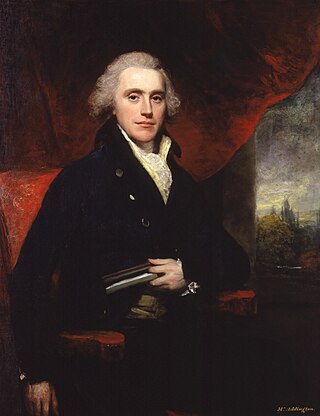
Henry Addington, 1st Viscount Sidmouth, was a British Tory statesman who served as prime minister of the United Kingdom from 1801 to 1804 and as Speaker of the House of Commons from 1789 to 1801.

Robert Banks Jenkinson, 2nd Earl of Liverpool, was a British Tory statesman who served as Prime Minister of the United Kingdom from 1812 to 1827. He also held many other important cabinet offices such as Foreign Secretary, Home Secretary and Secretary of State for War and the Colonies. He was also a member of the House of Lords and served as leader.
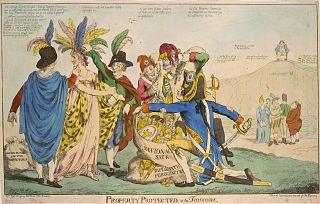
The XYZ Affair was a political and diplomatic episode in 1797 and 1798, early in the presidency of John Adams, involving a confrontation between the United States and Republican France that led to the Quasi-War. The name derives from the substitution of the letters X, Y, and Z for the names of French diplomats Jean-Conrad Hottinguer (X), Pierre Bellamy (Y), and Lucien Hauteval (Z) in documents released by the Adams administration.

Louis Antoine de Bourbon, Duke of Enghien was a member of the House of Bourbon of France. More famous for his death than his life, he was executed by order of Napoleon Bonaparte, who brought charges against him of aiding Britain and plotting against Napoleon.
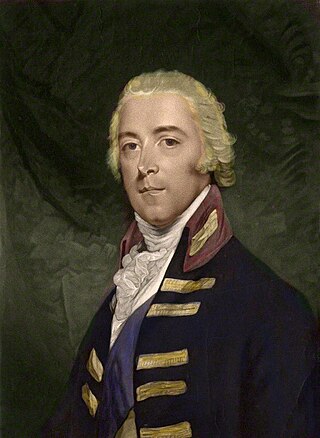
General John Pitt, 2nd Earl of Chatham, also 2nd Viscount Pitt and 2nd Baron Chatham, was a British soldier and politician. He spent a lengthy period in the cabinet but is best known for commanding the disastrous Walcheren Campaign of 1809.
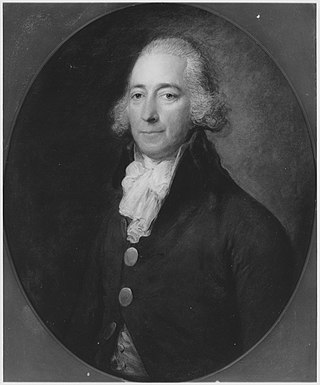
William Windham of Felbrigg Hall in Norfolk, was a British Whig statesman. Elected to Parliament in 1784, Windham was attached to the remnants of the Rockinghamite faction of Whigs, whose members included his friends Charles James Fox and Edmund Burke. Windham soon became noted for his oratory in the House of Commons.
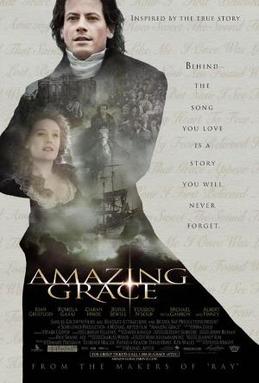
Amazing Grace is a 2006 biographical drama film directed by Michael Apted, about the abolitionist campaign against the slave trade in the British Empire, led by William Wilberforce, who was responsible for steering anti-slave trade legislation through the British parliament. The title is a reference to the 1772 hymn "Amazing Grace". The film also recounts the experiences of John Newton as a captain of slave ships and subsequent Christian conversion, which inspired his writing of the poem later used in the hymn. Newton is portrayed as a major influence on Wilberforce and the abolition movement.

That Hamilton Woman, also known as Lady Hamilton, is a 1941 black-and-white historical film drama produced and directed by Alexander Korda for his British company during his exile in the United States. Set during the Napoleonic Wars, the film tells the story of the rise and fall of Emma Hamilton, dance-hall girl and courtesan, who married Sir William Hamilton, British ambassador to the Kingdom of Naples, and later became Admiral Horatio Nelson's mistress.

The Magic Box is a 1951 British Technicolor biographical drama film directed by John Boulting. The film stars Robert Donat as William Friese-Greene, with numerous cameo appearances by performers such as Peter Ustinov and Laurence Olivier. It was produced by Ronald Neame and distributed by British Lion Film Corporation.

Charles Whitworth, 1st Earl Whitworth, GCB, PC, known as The Lord Whitworth between 1800 and 1813 and as The Viscount Whitworth between 1813 and 1815, was a British diplomat and politician.
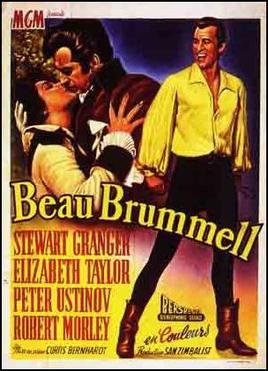
Beau Brummell is a 1954 British historical film released by Metro-Goldwyn-Mayer. It was directed by Curtis Bernhardt and produced by Sam Zimbalist from a screenplay by Karl Tunberg, based on the 1890 play Beau Brummell by Clyde Fitch. The play was previously adapted as a silent film made in 1924 and starring John Barrymore as Beau Brummell, Mary Astor, and Willard Louis as the Prince of Wales.
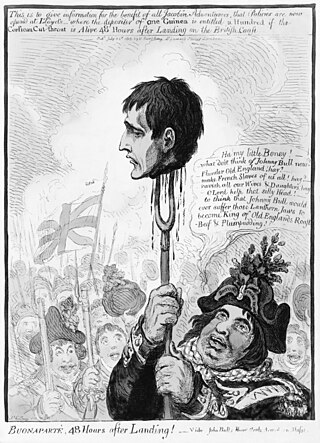
British anti-invasion preparations of 1803–05 were the military and civilian responses in the United Kingdom to Napoleon's planned invasion of the United Kingdom. They included mobilization of the population on a scale not previously attempted in Britain, with a combined military force of over 615,000 in December 1803. Much of the southern English coast was fortified, with numerous emplacements and forts built to repel the feared French landing. However, Napoleon never attempted his planned invasion and so the preparations were never put to the test.




















